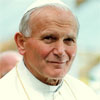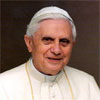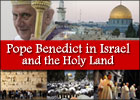- "Catholics and Jews: learning to disagree" - Some commentators argue that Catholic-Jewish relations are at an all-time low. In fact they have attained a new maturity, says the Catholic Herald's Anna Arco. (January 22, 2010).
- "Cordiality" and "mutual understanding" -- and not "crisis" or "breakdown" -- was how a joint Israel-Holy See statement described the most recent round of talks between the two sides. (Zenit News Service December 11, 2009). Speaking of which, here is a lengthy interview with Father David Maria Jaeger, Franciscan friar of the Custody of the Holy Land and a professor of canon law in Rome, on the state of Israeli-Vatican relations and the English-language statement released on January 20, 2010, upon the conclusion of a four-day meeting of the Bilateral Commission of the Holy See and the Chief Rabbinate of Israel.
- Mordechay Lewy, Israel's ambassador to the Holy See, urges Jewish openness to Catholics, admitting that there is an "asymmetry" in this dialogue (Zenit News Service. January 21, 2010):
Despite the fact that his government is in favor of "continual dialogue at the highest official levels, between the Central Rabbinate of Israel and the Holy See, there continues to be skepticism on the part of the main current of the orthodox," Lewy explained.
- Dimitri Cavalli (Haaretz) on the "much-maligned pontiff, Pope Pius XII":
The campaign against Pope Pius XII is doomed to failure because his detractors cannot sustain their main charges against him - that he was silent, pro-Nazi, and did little or nothing to help the Jews - with evidence. Perhaps only in a backward world such as ours would the one man who did more than any other wartime leader to help Jews and other Nazi victims, receive the greatest condemnation.
Wednesday, March 17, 2010
Jewish-Catholic Relations: A Roundup
Tuesday, April 7, 2009
Rabbi Shear Yashuv Cohen on Israeli-Vatican Relations
In October 2008, Rabbi Cohen had the honor of becoming the first Jew to address a synod of Catholic bishops at the at the Second General Congregation of the Bishops’ synod on the Bible.Rabbi Cohen said the Pope went out of his way to make it clear the Vatican would never question Israel’s sovereignty, nor challenge its rights to rule over the Old City of Jerusalem. Between 1949 and 1967, the Old City remained under Jordan’s Islamic rule, and Jews were barred from entering it.
He said both himself and other Israeli rabbis are open to Pope Benedict’s idea of establishing an inter-religious council where all of the religions represented in the Holy City could be called together to discuss both the practical and spiritual aspects of Jerusalem’s present and future.
The rabbi also discussed the warm interpersonal relations that developed between the rabbis and the Vatican officials. ... read more.
Regretfully, Rabbi Cohen also raised the provocative question of Pope Pius XII:
“We refer to him as ‘the Holocaust Pope,’” said Rabbi Cohen. “Although he may have helped individual Jews, he did not fulfill his role to protest the mass slaughter of Jews. Rabbi Cohen expressed the view that if the Vatican does claim that Pope Pius XII did extraordinary things to help the Jews during the war, then the Vatican should open its archives to provide documentation of such.”With all due respect, we beg to differ with this assessment of Pius XII, and firmly maintain that an examination of the facts will vindicate his name.
For further details see our online archive: Pope Pius XII, the Jews and the Holocaust.
Friday, February 13, 2009
Pope Benedict XVI meets with Jewish delegation from the United States, confirms intention to visit to Israel and the Holy Land
According to sources from both Jerusalem and Rome, the Holy Father's first pilgrimage to Israel and the surrounding region will take place during the second week of May.He confirmed his intention to make the visit, despite doubts cast on the plan by the conflict in Gaza and the scandal caused by Lefebvrite Bishop Richard Williamson.
Rabbi Arthur Schneier of New York told the Pontiff, "The promised land awaits your arrival."
And noting that his guests were scheduled to visit the Holy Land after their time in Italy, Benedict XVI said: "I too am preparing to visit Israel, a land which is holy for Christians as well as Jews, since the roots of our faith are to be found there.
"Indeed, the Church draws its sustenance from the root of that good olive tree, the people of Israel, onto which have been grafted the wild olive branches of the Gentiles. From the earliest days of Christianity, our identity and every aspect of our life and worship have been intimately bound up with the ancient religion of our fathers in faith."

Click here for the full text of Pope Benedict XVI's address to the Conference of Presidents of Major American Jewish Organizations -- in which the Holy Father recalled his meeting the Jewish community at Cologne (making history as the first Pope to visit a synagogue in Germany), in August 2005; his visit to the extermination camp at Auschwitz-Birkenau in May 2006, his meeting with Rabbi Schneier and congregation of the Park East Synagogue in New York during his 2008 visit to the United States.
Chiefly, Pope Benedict recalled the importance of recognizing the Shoah (alluding to the recent controversy involving SSPX Bishop Richard Williamson):
The two-thousand-year history of the relationship between Judaism and the Church has passed through many different phases, some of them painful to recall. Now that we are able to meet in a spirit of reconciliation, we must not allow past difficulties to hold us back from extending to one another the hand of friendship. Indeed, what family is there that has not been troubled by tensions of one kind or another? The Second Vatican Council’s Declaration "Nostra Aetate" marked a milestone in the journey towards reconciliation, and clearly outlined the principles that have governed the Church’s approach to Christian-Jewish relations ever since.The Church is profoundly and irrevocably committed to reject all anti-Semitism and to continue to build good and lasting relations between our two communities. If there is one particular image which encapsulates this commitment, it is the moment when my beloved predecessor Pope John Paul II stood at the Western Wall in Jerusalem, pleading for God’s forgiveness after all the injustice that the Jewish people have had to suffer. I now make his prayer my own: "God of our fathers, you chose Abraham and his descendants to bring your Name to the Nations: we are deeply saddened by the behaviour of those who in the course of history have caused these children of yours to suffer, and asking your forgiveness we wish to commit ourselves to genuine brotherhood with the people of the Covenant" (26 March 2000).
The hatred and contempt for men, women and children that was manifested in the Shoah was a crime against God and against humanity. This should be clear to everyone, especially to those standing in the tradition of the Holy Scriptures, according to which every human being is created in the image and likeness of God (Gen 1:26-27). It is beyond question that any denial or minimization of this terrible crime is intolerable and altogether unacceptable. Recently, in a public audience, I reaffirmed that the Shoah must be "a warning for all against forgetfulness, denial or reductionism, because violence committed against one single human being is violence against all" (January 28, 2009).
This terrible chapter in our history must never be forgotten. Remembrance – it is rightly said – is "memoria futuri", a warning to us for the future, and a summons to strive for reconciliation. To remember is to do everything in our power to prevent any recurrence of such a catastrophe within the human family by building bridges of lasting friendship. It is my fervent prayer that the memory of this appalling crime will strengthen our determination to heal the wounds that for too long have sullied relations between Christians and Jews. It is my heartfelt desire that the friendship we now enjoy will grow ever stronger, so that the Church’s irrevocable commitment to respectful and harmonious relations with the people of the Covenant will bear fruit in abundance.
Sunday, January 18, 2009
Understanding the Vatican's "Neutrality" on the conflict in Gaza
Now as an Israeli (and it would be the same for the citizen of any other Nation), it never displeases me to see that there are those who look at my Nation with sympathy, who wish to understand its reasons, and who are determined to comprehend even the most difficult and controversial choices of its government. And as a human being, first and foremost, it can never displease me that there are those who feel deeply for the unending sufferings of a helpless civilian population, which is even otherwise sorely tried. But as a Catholic, as a Priest, it offends me that there are those who abuse this as an occasion to attack the Church. It displeases me very much that that there are still any who obstinately refuse to recognise that the Church in general, and the Holy See in particular, do not participate, and by their nature cannot participate, in political debate, do not take sides in temporal disputes, cannot and must not do it, and that in the end it is in the interest of everybody that they do not; that there are those who decline to acknowledge that the Holy See is not simply one more voice in the often cacophonous chorus of international actors.
The Church speaks on a completely different plane. She has a completely different mission. The Church never supports one Nation against another, and never acts as arbitrator, except when invited to do so by all the parties concerned. The Church promotes solely the exigencies of humanity and gives voice to mercy, to divine and human pity, to that righteousness that love alone fulfils. If there are circumstances in which political communities, acting within the specific logic of this-worldly power-relationships, judge that they cannot avoid the recourse to force, the Church cannot be there to bless their arms. This was recognised by Benedict XV well before being confirmed by Benedict XVI.
The persistence of the Holy See in discouraging and deploring always, everywhere and in whatever circumstances, the recourse to violence, and in promoting “in season and out of season” the sole ways of peaceful dialogue, cannot be reduced to the level of the disagreements among actors on the international scene, but must be seen as the pure expression of its own mission in representation of a “Kingdom that is not of this world. To read these expressions of that which is specific to the Church as if they were simple political partisanship, or the fruit of cold diplomatic calculations, or else ostentation of some “pacifist ideology” (in opposition to other political-military doctrines), means not knowing who and what the Church is. And when those who do so are cultured persons, who should be able to know better and understand more, this kind of attitude causes much wonderment, indeed perplexity and sadness.
Let all of these critics pause for a moment and think, and let them then admit that if the Church of Christ were to abandon this her high mission, and were to lower herself to the level of just another participant in the quarrel – albeit on the side that they believe to be in the right – our world would thereby be made frighteningly and dangerously the poorer.
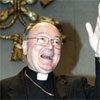 Personally, I can respect the Vatican's position as described by Fr. Jaeger. I would also add that this position as explicated in this essay seems to be fully embodied in the words and actions of Pope Benedict XVI.
Personally, I can respect the Vatican's position as described by Fr. Jaeger. I would also add that this position as explicated in this essay seems to be fully embodied in the words and actions of Pope Benedict XVI. Less so, or perhaps not at all, in Cardinal Martino, who -- in keeping with a remarkable penchant for provoking repeated controversy with the most ridiculous of remarks -- likened the situation in Gaza to "a concentration camp".
According to the New York Times, The Vatican sought to distance itself from Martino's remarks:
The Vatican spokesman, Rev. Federico Lombardi, called Cardinal Martino’s choice of words “inopportune,” and said they created “irritation and confusion” more than illumination.While calling the cardinal “an authoritative person,” Rev. Lombardi added that “The more authoritative voice and line would be that of the pope.”
Thursday, January 15, 2009
The Vatican's response to the war between Israel and Hamas
The authorities of the Catholic Church do not defend the existence of Israel – which its enemies want to annihilate, and is ultimately at stake in the conflict – with the same explicit, powerful determination with which they raise their voices in defense of the "nonnegotiable" principles concerning human life.Many are prompted to wonder what kind of "dialogue" can possibly be achieved with those who not only show little inclination to engage in discourse, but, according to its fundamental statement of principles, asserts that "Israel will rise and will remain erect until Islam eliminates it as it had eliminated its predecessors"; that militant Jihad against Israel is "an individual duty binding on every Muslim man and woman"; that "[Peace] initiatives, the so-called peaceful solutions, and the international conferences to resolve the Palestinian problem, are all contrary to the beliefs of the Islamic Resistance Movement" and that "There is no solution to the Palestinian problem except by Jihad. The initiatives, proposals and International Conferences are but a waste of time, an exercise in futility."This has been seen in recent days. The authorities of the Church, and Benedict XVI himself, have raised their voices in condemnation of "the massive violence that has broken out in the Gaza Strip in response to other violence" only after Israel began bombing the installations of the terrorist movement Hamas in that territory. Not before. Not when Hamas was tightening its brutal grip on Gaza, massacring the Muslims faithful to president Abu Mazen, humiliating the tiny Christian communities, and launching rockets every day against the Israelis in the surrounding area.
About Hamas and its vaunted "mission" of wiping the Jewish state from the face of the earth, about Hamas as an outpost for Iran's expansionist aims in the Middle East, about Hamas as an ally of Hezbollah and Syria, the Vatican authorities have never raised the red alert. They have never shown that they see Hamas as a deadly danger to Israel and an obstacle to the birth of a Palestinian state, in addition to its being a nightmare for the Arab regimes in the area, from Egypt to Jordan to Saudi Arabia.
In the December 29-30 issue of L'Osservatore Romano, a front-page commentary by Luca M. Possati, checked word by word by the Vatican secretariat of state, claimed that "for the Jewish state, the only possible idea of security must come through dialogue with all, even those who do not recognize it." Read: Hamas.
This past week, Cardinal Renato Martino, President of the Pontifical Council for Justice and Peace, fanned the flames of controversy with a comparison of the Gaza Strip to "a huge concentration camp". John Allen Jr covered the incident:
To be fair to Martino, the full text of his comments on Gaza comes across as more balanced than the sound-bite cited above. Here's what he said, in a Jan. 7 interview with the Italian Web site Il Sussidiario ("Subsidiarity"), in my translation: "The consequences of egoism are hatred, poverty and injustice. It's always the unarmed populations who pay. Look at the conditions in Gaza -- more and more, it resembles a huge concentration camp. …What's needed is will on both sides, because both are guilty. Israelis and Palestinians are sons of the same land, and they have to be separated, like you'd do with two brothers. … If they can't come to an agreement, someone else has to feel the duty to do it. The world can't stand by and do nothing."Mr. Allen, appearing sympathetic to the frustration of Israelis with the Vatican's response ("here's what drives Israelis crazy: Generally, the Vatican gets cranked up to denounce violence in the Holy Land only when it's initiated by Israel"), nonetheless emphasizes four points to put it all in context:Yet even given that context, Martino is no naïf, having spent 16 years as the Vatican's observer to the United Nations. He had to know that his reference to a "concentration camp" could not help but call to mind the crude imagery popular in Arab and Islamic extremist circles comparing Israel to Nazi Germany. Cartoons routinely show the Star of David twisted into a swastika, Israeli Defense Forces dressed up as SS storm troopers, and so on. The comment was, therefore, the diplomatic equivalent of a poke in the eye. (That's not to mention the dubious wisdom of a Vatican official invoking the memory of World War II-era concentration camps, since the question of Christian acquiescence in the Holocaust remains a tremendously sensitive point in Christian/Jewish relations.)
This, of course, is merely the latest instance in which Israel and its supporters have complained about prejudice in the Vatican's approach to what it calls the "Holy Land" -- a linguistic convention intended to express neutrality, but taken by many Israelis as a subtle refusal to recognize the legitimacy of the Jewish state.
- First, the broad aim of Vatican diplomacy is to support a two-state solution that would provide stability and security for both Israelis and Palestinians. As a result, commentary from the Holy See has been critical of violence on both sides. In his Angelus address on January 1, for example, Pope Benedict XVI affirmed "the profound desire to live in peace that stirs in the hearts of the vast majority of both the Israeli and Palestinian populations, which has one again been placed at risk by the massive violence unleashed in the Gaza Strip in response to other violence." On Jan. 4, the pope implored "the authorities and those responsible on both sides, Israeli and Palestinian, to act immediately to put an end to this tragic situation."
- Second, in the past the most egregiously anti-Israeli line from the Vatican generally came from L'Osservatore Romano under its former editor, Italian layman Mario Agnes. A transition in leadership has meant that this time around, the tone from Vatican media has been more even-handed. A statement from Jesuit Fr. Federico Lombardi, the Vatican spokesperson, in late December on Vatican Radio offers a case in point: "Hamas is a prisoner of a logic of hatred," Lombardi said, "Israel of a logic of trusting in force as the best response to hatred."
- Third, Benedict XVI has been far more willing to openly challenge Muslim leaders to repudiate violence and terrorism than John Paul II, as well as to demand "reciprocity," meaning an acknowledgement of the right to religious freedom, from majority Islamic states.
- Fourth, despite Martino's rhetoric, not everyone perceives an anti-Israeli tilt to Vatican commentary. After Benedict XVI condemned the violence in Gaza on Jan. 6, a prominent Saudi commentator wrote: "The pope could and should have been much more explicit. He should have convened a synod for Gaza, as he did for Lebanon. But he preferred to kowtow to the Jews, whatever their crimes and sins."
Last week, The Vatican expressed alarm over the burning of Israeli flags by Muslims protesting against Israeli actions in Gaza during Muslim prayers staged outside Italian cathedrals (according to Robert Owen of the Times (UK), reports):
Cardinal Renato Martino, head of the Vatican Council for Justice and Peace, said he was not disturbed "by prayer as such." If Muslims wished to come to St Peter's to pray, he would not object, the cardinal said. "Prayer always does good".However, Abu Imad, the imam of the main Milan mosque, claimed that the demonstration had ended up on the cathedral square "by chance" at the hour of prayer, "so we prayed. There was no provocation or insult intended."However prayers held recently outside the Duomo in Milan and the Basilica of San Petronio in Bologna, with thousands of prostrate Muslims facing Mecca, had been accompanied by flag burning which was not only anti Israeli but anti Semitic, with protesters carrying banners depicting the Star of David alongside the Nazi swastika. "What matters is the spirit in which one prays - and prayer excludes hate" Cardinal Martino said.
Bishop Ernesto Vecchi, vicar general of the Bologna diocese, said the Muslim prayers were "not just prayers but a challenge, not so much to the basilica itself as to our democratic system and culture". Bishop Vecchi suggested the staging of mass prayers outside Christian churches in Italy was a deliberate move "on orders from afar" as part of a strategy of "Islamisation" of Europe.
On Friday, January 9th, Archbishop Silvano Tomasi, the Holy See's permanent observer at the U.N. offices in Geneva, delivered the following address regarding the conflict in Gaza (via Zenit News Service):
The Delegation of the Holy See would like to express its solidarity with both the people in Gaza, who are dying and suffering because of the ongoing military assault by the Israeli Defense Forces, and the people in Sderot, Ashkelon and other Israeli cities who are living under the constant terror of rocket attacks launched by Palestinian militants from within the Gaza Strip, which have caused casualties and wounded a number of people.The patriarchs and heads of churches of Jerusalem marked last Sunday as a day of prayer with the intention to put an end to the conflict in Gaza and to restore peace and justice in the Holy Land. It is their conviction that the continuation of bloodshed and violence will not lead to peace and justice but breed more hatred and hostility and thus a continued confrontation between the two peoples. These religious leaders call upon both parties to return to their senses and refrain from all violent acts, which only bring destruction and tragedy. They urge them instead to work to resolve their differences through peaceful and nonviolent means.
The Holy Father, Benedict XVI, underlined last Sunday that the refusal of dialogue between the parties has led to unspeakable suffering for the population in Gaza, victims of hatred and war.
Mr. President, it is evident that the warring parties are not able to exit from this vicious circle of violence without the help of the international community that should therefore fulfill its responsibilities, intervene actively to stop the bloodshed, provide access for emergency humanitarian assistance, and end all forms of confrontation. At the same time, the international community should remain engaged in removing the root causes of the conflict that can only be resolved within the framework of a lasting solution of the greater Israeli-Palestinian conflict, based on the international resolutions adopted during the years.
May I conclude with the words of Pope Benedict XVI pronounced yesterday during the annual meeting with diplomats accredited to the Holy See: "Once again I would repeat that military options are no solution and that violence, wherever it comes from and whatever form it takes, must be firmly condemned. I express my hope that, with the decisive commitment of the international community, the ceasefire in the Gaza Strip will be re-established -- an indispensable condition for restoring acceptable living conditions to the population -- and that negotiations for peace will resume, with the rejection of hatred, acts of provocation and the use of arms."
Sunday, June 1, 2008
Vatican, Israel report progress in talks
Reports indicate that all participants came out of the meeting with “cautious satisfaction”.Although it is not known what was discussed, from the start the Church has called on Israeli authorities to recognise its historic tax exemptions as well as return Church properties lost over the years.
The Commission decided that its next meeting will take place in December. The recent round of negotiations comes after five years of deadlock. They began with a meeting on 21 May 2007, followed by another on 13 December 2007, and then today’s session.
With the next plenary meeting scheduled for December in Jerusalem, the Commission now seems set to meet on a regular basis, twice a year.
Background Reading: Israel-Vatican Relations & The Fundamental Agreement February 12, 2007.
Monday, February 12, 2007
Israel-Vatican Relations & The Fundamental Agreement
The Fundamental Agreement extends the theological advances of Nostra Aetate into the political realm, creating for the first time formal diplomatic relations between the Holy See and the State of Israel. The Agreement signifi es a historic step in the evolution of the Roman Catholic Church’s attitude toward Judaism and the Jewish People.[Source: Milestones in Israel-Holy See Relations 1993-2005: Commemoration of the 40th Anniversary of Nostra Aetate Consulate General of Israel in New York].The Fundamental Agreement addresses three spheres of relations: 1) political relations between Israel and the Holy See; 2) relations between the Jewish People and the Catholic Church; and 3) relations between the State of Israel and the Roman Catholic Church.
In 1997 the "Legal Personality" Agreement between the State of Israel and the Holy See was signed:
[regularizing] the status and legal personality of the Roman Catholic Church and its institutions under Israeli law, after approximately 500 years of undefined legal status under Ottoman Empire, the British Mandate, and Israeli sovereignty.This agreement marks the first de jure recognition of the Roman Catholic Church by any government in the Holy Land. It bestows upon the Roman Catholic Church the autonomy to run its internal affairs, subject to Israeli law in interaction with other bodies. The Legal Personality Agreement constitutes a continuation of the Fundamental Agreement of 1993.
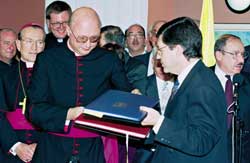 In an exclusive article, The ten years of the Fundamental Agreement 30 Giorni ["30 Days"] No. 12, 2003, Israeli statesman Yossi Beilin describes the "behind the scenes" discussions which led to the signing:
In an exclusive article, The ten years of the Fundamental Agreement 30 Giorni ["30 Days"] No. 12, 2003, Israeli statesman Yossi Beilin describes the "behind the scenes" discussions which led to the signing:
These were open talks, launched at the Vatican’s initiative in the summer of 1991, even before the Madrid Conference. It was Archbishop Andrea Cordero Lanza di Montezemolo, the apostolic delegate in Jerusalem, who announced the Vatican’s intention to initiate negotiations on an agreement with Israel, and he did so in consultation with Dr. David Jaegar, an Israeli Jew who had become a Franciscan priest, with boasted special knowledge in Canon Law.The initial probes between Israel and the Vatican revealed the main dispute between them: Israel wanted to reach, first of all, an agreement on diplomatic relations between the two states, and only subsequently to discuss questions such as the freedom of religion, Church taxation, education, etc. The Vatican wanted to deal with all the practical matters, and to remove – at least at the first stage – the matter of the diplomatic relations from the agenda. . . .
Each party came to the table with its own priorities -- for Israel, the objective was (understandably) "the common war on anti-Semitism and unequivocal recognition of the State of Israel." For the Church, the concern lay with the rights of Catholics residing in the State of Israel:
. . . the guarantee of freedom of worship for Catholics, the legal status of priests, and the special approach of Pope John Paul II, who, as early as 1981, had sent to the President of the State of Israel a blessing for the New Year, and in 1986, had visited the synagogue in Rome – symbolic acts which stressed – alongside a long list of other acts – his special deep respect for Israel and its people.
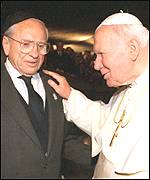 John Paul II's greetings to Israel in celebration of their new year appears to have sprung from a collaboration with his lifelong friend Jerzy Kluger, who played a subtle yet instrumental role (at the Pope's request) in facilitating communication between Israel and the Vatican (How a Pope's Boyhood Friend Helped Forge Ties to Israel):
John Paul II's greetings to Israel in celebration of their new year appears to have sprung from a collaboration with his lifelong friend Jerzy Kluger, who played a subtle yet instrumental role (at the Pope's request) in facilitating communication between Israel and the Vatican (How a Pope's Boyhood Friend Helped Forge Ties to Israel):When the Archbishop was named Pope in 1978, he stunned the world by granting his first papal audience, or formal reception, to Mr. Kluger and his family.(Pope John Paul II and Jerzy Kluger's friendship was made the subject of Darcy O'Brien's The Hidden Pope: The Untold Story of a Lifelong Friendship (Roedale Books, 1998).Three years later, the Pope was wounded in an assassination attempt. On Mr. Kluger's third visit to the Pope in the hospital, the Pope suggested that with the Camp David accords pointing the way for peace in the Middle East, it was time for the Vatican to consider opening diplomatic channels to Israel.
"Are you willing to help?" Mr. Kluger says the Pope asked him. "We must proceed cautiously, officially and unofficially."
Mr. Kluger played the role of broker and host, inviting Israeli and Vatican representatives to dine at his tennis club in Rome and playing bridge with key Cardinals. The steps were often small and symbolic. Once he relayed an Israeli diplomat's suggestion that the Pope send a telegram with Jewish New Year greetings to the President of Israel. The Pope sent the telegram.
In 1994, at the ceremony welcoming the first Israeli Ambassador to the Holy See, Mr. Kluger stood for photographs next to the Pope, sandwiched between Israeli and Vatican dignitaries.
"I was a friend," Mr. Kluger said. "And we had friendly conversations, and friendly relationships which one way or another helped these developments. That's all."
Related Commentary on The Fundamental Agreement
- In Israel-Vatican Relations Since the Signing of the Fundamental Agreement, Rabbi David Rosen discusses some of the conceptual conceptual hurdles that were tackled in the process of formalizing the Fundamental Agreement and Israeli-Catholic relations since its signing in 1993. [Microsoft Word - printable format]:
. . . as the Preamble of the Agreement indicates, the accord took place within the wider context of Catholic-Jewish reconciliation on which it undoubtedly had a profoundly positive impact in turn. Indeed, for many Jews especially in Israel, the diplomatic normalization served as testimony and proof of the genuineness of the transformation in theological attitudes and teaching that had taken place over the previous thirty years. The third relationship addressed by the majority of the articles in the Fundamental Agreement, concerns the relationship between the Catholic Church in Israel and the State.
Rosen's article was published in the anthology The Vatican-Israel Accords: Political, Legal, and Theological Contexts, edited by Marshall J. Breger. University of Notre Dame Press (February 2004).While Israel's goal was essentially the first of these3, the Holy See's primary interest concerned the third. Indeed this difference reflects the divergent perceptions of the principle purpose of the bilateral relations.
- Israel's Relations with the Vatican by Aharon Lopez (former Israeli ambassador to Vatican). No. 401 13 Adar 5759 / 1 March 1999. Jerusalem Center for Public Affairs:
The establishment of diplomatic relations between Israel and the Holy See is not to be considered as a point of arrival, but rather as a starting point. We are climbing up a mountain together and, from time to time, we reach important and substantial milestones towards the mountain's peak.
In closing, let me share with you a very significant event which I cherish close to my heart. At the beginning of my mission as Ambassador to the Holy See, I received a fax from an Israeli Christian Arab who requested my help in asking the Pope to baptize his son. He and his wife were especially keen in seeing their wish fulfilled because, sadly, they had experienced the tragic loss of their first son.
Knowing that there are "only" 989 million Catholics all over the world, I feared we might have some difficulties in fulfilling such a request. Nevertheless, I contacted the proper authorities in the Vatican and emphasized that during the presentation of my credentials I had assured the Pope that I am representing all Israeli citizens--Moslems, Christians, and Jews alike--and therefore it was my duty to submit this request on behalf of a Christian citizen of Israel.
I was very pleased, a few weeks later, to receive a positive answer. Indeed, the Pope agreed to conduct the ceremony in his private chapel. I will never forget the smile on the face of the boy's parents after their dream came true.
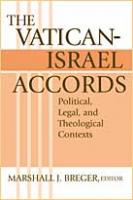 The Vatican-Israel Accords: Political, Legal, and Theological Contexts, edited by Marshall J. Breger. University of Notre Dame Press (February 2004). [Contents].
The Vatican-Israel Accords: Political, Legal, and Theological Contexts, edited by Marshall J. Breger. University of Notre Dame Press (February 2004). [Contents].Published during the tenth anniversary year of The Fundamental Agreement, The Vatican-Israel Accords brings together essays that analyze the legal, historical, theological, and political meaning of the Accords.
The compelling essays in this collection explore not only the document and events surrounding its signing, but also the past, present, and future of Catholic-Jewish relations. Contributors, who include scholars from Israel, Italy, France, Spain, and the United States, contend that the history and structure of the Accords offer lessons that may be instructive for others involved in seeking peaceful resolutions to conflict, particularly those who work for peace between Palestine and Israel.
Contributors: Marshall J. Breger, Laurenzo Cremonesi, Msgr. Richard Mathes, David-Maria A. Jaeger, O.F.M., Leonard Hammer, Silvio Ferrari, Rafael Palomino, Msgr. Roland Minnerath, Rabbi David Rosen, Moshe Hirsch, Geoffrey Watson, Giorgio Filibeck, Ruth Lapidoth, Fr. Drew Christiansen, S.J., and Rabbi Jack Bemporad.
MARSHALL J. BREGER is professor of law at the Columbus School of Law, Catholic University of America.
Reviews "The Vatican-Israel Accords promises to make a tremendous contribution to understanding a tangled relationship. It is a unique, and uniquely valuable, volume." --George Weigel, Ethics and Public Policy Center, Washington, D.C.
Israeli-Catholic relations since the 1993 signing have not always gone smoothly. Sandro Magister reported on two impediments to Israeli-Vatican relations and the subsequent implementation of the Vatican-Israel accords (with regards to financial issues and the status of Church property) in 2005:
The first skirmish came on July 12. That day, John Paul II was commemorated in the Israeli parliament, the Knesset. And on that occasion, apostolic nuncio Pietro Sambi delivered a speech that was reprinted in its entirety by "L'Osservatore Romano" six days later.For further analysis on Pope Benedict's 2005 omission of Israel from a list of recent victims of terrorism, I refer to John Allen Jr.'s "Context crucial in Vatican-Israel uproar" (National Catholic Reporter, August 12, 2005).In the speech, Sambi complained about Israel's failure to take practical measures to implement the accords with the Holy See reached in 1993 and 1994:
"The Fundamental Agreement, which was ratified by the state of Israel on February 20, 1994, and is recognized internationally, has not yet been incorporated into Israeli law by the Knesset. The same must be said of the Legal Personality Agreement ratified by Israel on December 16, 1998, and recognized internationally on February 3, 1999. The so-called 'Economic Agreement', prescribed by article 10 of the Fundamental Agreement, has not yet been concluded."
A meeting between the two parties to discuss the application of these agreements had been planned for July 26. But the meeting never took place, to the great disappointment of the Holy See and the Catholic community in the Holy Land.
On the day the ceremony was taking place in the Knesset, on July 12, Islamic terrorists carried out a serious attack in Netanya.
But at the Sunday Angelus on July 24, Benedict XVI did not mention Israel as being among the countries recently struck by terrorist attacks: Egypt, Turkey, Iraq, Great Britain.
Exploiting this omission, the next day the Israeli foreign minister summoned the Vatican nuncio, Pietro Sambi, to communicate a note of protest [...]
After some tit-for-tat jousting between diplomats, Israeli Prime Minister Ariel Sharon moved to resolve any ill-feelings with the Vatican in a personal letter ("Israel, Vatican mend fences after dispute over pope's terrorism comments", by Arial David. World Wide Religious News August 27, 2005):
In his letter, Sharon said Benedict's efforts to promote dialogue with Jews and Israel made him "a true friend of Israel, genuinely committed to advancing tolerance, understanding and reconciliation," Ben Hur said in a phone interview, reading from the letter. He said Sharon then explained the reasons for his country's reaction to the omission."Israel has been devastated and victimized by terrorism, and we are very sensitive to any attempt to distinguish between Islamic terrorism which systematically targets innocent Israeli civilians and that which is aimed at citizens of other countries," Sharon wrote.
Sodano expressed his satisfaction with the letter during Tuesday's meeting, saying both sides had made mistakes and that he was happy to put the issue behind him, Ben Hur said. The letter also invited Sodano to visit Israel.
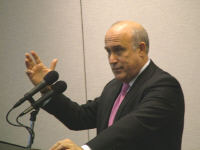
In August 2006, Magister also featured an interview with Israeli ambassador Oded Ben Hur, in which he commmented further on Israel's perception of Pope Benedict and Israel's expectations of Rome:
In mid-July, just when the war had broken out in Lebanon, [Oded] was deeply troubled by the first statements from the Vatican authorities: “All of them went the same way, against Israel. The true aggressor, Hezbollah, wasn’t even mentioned by name. But after this the judgments became more balanced.”Q: Did this happen when Benedict XVI began speaking out personally?
A: I would go so far as to say that Benedict XVI looks at Israel from a different point of view, compared to others. He sees the state of Israel not as an error of history, but as the heart of the Jewish world, a heart that by right should beat in Jerusalem. At the same time he is a realistic pope, who understands that the Church’s political influence is limited. He knows that the Church’s strength is not political, but moral. And it is there that he exerts himself most. It’s the pope as the great educator of the world, reawakening consciences, illuminating the darkness of ignorance, and pointing out where evil is triumphing over the good.
Q: The Middle East is one of the places where evil abounds the most.
A: And it may be that today the international community is taking greater notice of this. What happened in Lebanon was not the rupture of a situation of peace. Peace wasn’t there before this war. In that country there was a cancer named Hezbollah, a state within the state, which held the civil population hostage and fought a war while using this population as a shield. Even today, after the ceasefire, Hezbollah says it does not at all consider the war to be over, and is refusing to disarm. And Hamas continues to launch Kassam rockets against Israeli cities. [...]
Q: What is expected from the Church of Rome?
A: A great deal. In Lebanon there is a strong Christian community that can act as a bridge for peace. The pilgrims to the holy places, when they come in great numbers, are also helpful to the local populations. I also have an idea that I have already proposed to the Vatican authorities: that of creating a task force with representatives from the three religions – Christianity, Judaism, and Islam – who would travel throughout the various countries of the Middle East spreading a message of reconciliation, in order to sensitize and mobilize those who sincerely desire peace, and separate them from extremist and violent groups.
In December of 2006 Israeli Prime Minister Ehud Olmert met with Pope Benedict XVI (Catholic News Service Dec. 14, 2006) - among the topics of discussion was the "dwindling Catholic population in the Holy Land, including in Bethlehem," and peace in the Middle East:
Ben-Hur said Pope Benedict thanked the prime minister for Israeli's declaration of a cease-fire with Palestinian militias, although Ben-Hur said the prime minister said it is getting more and more difficult "to withhold reactions" to missiles being launched into Israel from Gaza.Ben-Hur said that when Olmert renewed a government invitation for the pope to visit Israel, the pope said he really wanted to make such a trip, but was looking for "a moment of calm."
"The prime minister told him, 'You can bring the calm,'" the ambassador said.
Talks between Israel and the Vatican resumed in 2007 with the goal of applying the provisions of the Fundamental Agreement's over the holy places, the Church‘s properties, and finances. In Holy See-Israel: painstaking resumption of negotiations (AsiaNews.it Bernardo Cervellera, December 12, 2006), Oded Ben Hur gave another interview on the nature of the impediments to negotations.
Related Resources
- Franciscan Custody of the Holy Land, the institution that cares for the property of the Catholic Church in Israel and the Territories.
- Catholic Friends of Israel, founded by Don Kenner. I came into contact with Mr. Kenner shortly after the Israeli-Hezbollah conflict in July-August 2006 and have become an occasional contributor to their blog. To learn about the founder of CFOI, I recommend this interview with IsraPundit; see also "The Bishops and the Suicide Bomber" FrontPageMag January 28, 2004).
- Christians for Fair Witness on the Middle East, founded by Sr. Ruth Lautt, O.P., Esq., advocates among mainline Protestants and Roman Catholics in North America for fairness in the churches’ witness on issues related to the conflict between Israel and its Arab neighbors.
- Milestones in Israel-Holy See Relations 1993-2005: Commemoration of the 40th Anniversary of Nostra Aetate Consulate General of Israel in New York.
- Pave The Way Foundation "dedicated to achieving peace by bridging the gap in tolerance and understanding, between religions through cultural, technological and intellectual exchanges." Gary Krupp, the founder, was promoted to the highest Pontifical Order of St. Gregory the Great -- the first Jewish man to be knighted by two popes.
Updates
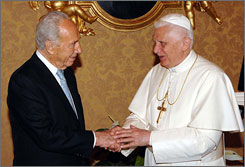 On September 9, 2007, Shimon Peres, in his first foreign visit as president of Israel, met with Pope Benedict at Castel Gandolfo and members of the Vatican curia, to discuss Catholic-Israeli relations and the situation in the Middle East. AsiaNews.it reports:
On September 9, 2007, Shimon Peres, in his first foreign visit as president of Israel, met with Pope Benedict at Castel Gandolfo and members of the Vatican curia, to discuss Catholic-Israeli relations and the situation in the Middle East. AsiaNews.it reports:Rome (AsiaNews) – The Israeli President Shimon Peres is “quite optimistic” regarding negotiations between Israel and the Holy See and has declared that “within the years end the most important problems will be resolved”. Answering a question put forward by AsiaNews, during a press conference, he also said that he had invited Benedict XVI to visit Israel. ...
On the long standing question of the implementation of the Fundamental Agreement, 13 years on from its signing, the Holy See statement urges “a rapid conclusion to the important ongoing negotiations and the beginning of a constant dialogue with Israeli Authorities and local Christian communities, in view of their participation in working for the common good”.
September 3 last –after a long summer pause – and after years of deadlock, negotiations between the Holy See and Israel recommenced. They aim to lead to an agreement regarding issues of taxation and Church properties, which have been waiting implementation since ’93.
The Vatican statement makes no reference whatsoever to a possible visit by Benedict XVI to Israel, even if the pope has already expressed a positive opinion in the past. Peres told journalists that he was “moved” by the pope’s reaction to his proposal and defined Benedict XVI as “great spiritual figure”, underlining that “the Spirit” incarnated in the religions can give an important impulse to peace and the elimination of violence, “assassins and killings”.


